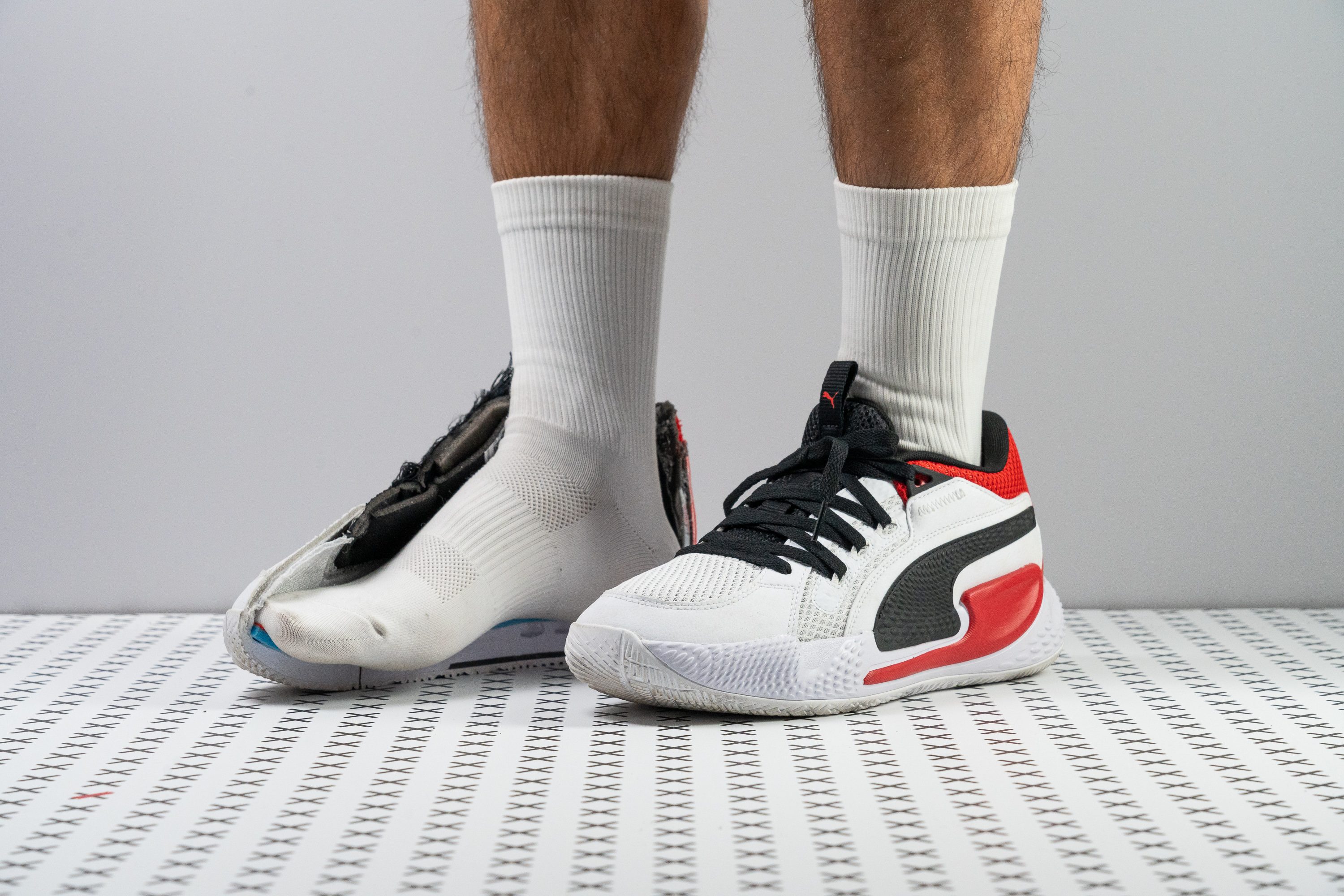Our verdict
- Top pick in best PUMA basketball shoes
Pros
- Pronounced court feel
- Amazing stability and support
- Secure lockdown
- Comfy in-shoe feel
- Great value for money
- True to size and fit
- Stylish for casual wear
Cons
- Heavier than average
- Lacks breathability
- Not much impact protection
Audience verdict
Comparison
The most similar basketball shoes compared
+ + Add a shoe | |||||
|---|---|---|---|---|---|
| Audience score | 86 Good! | 83 Good! | 85 Good! | 88 Great! | |
| Price | £100 | £80 | £90 | £130 | |
| Signature | - | Giannis Antetokounmpo | Damian Lillard | Trae Young | |
| Shock absorption | - | Moderate | - | - | |
| Energy return | - | Low | - | - | |
| Traction | - | Moderate | - | - | |
| Top | Low | Low | Low | Low | |
| Ankle support | ✓ | ✓ | ✓ | ✓ | |
| Weight lab | 15.8 oz / 449g | 12.6 oz / 356g | 14.3 oz / 404g | 15 oz / 425g | |
| Lightweight | ✗ | ✓ | ✗ | ✗ | |
| Breathability | Moderate | Moderate | Warm | Moderate | |
| Outsole durability | - | Bad | Good | Good | |
| Drop lab | 9.2 mm | 5.4 mm | 9.8 mm | 8.9 mm | |
| Heel stack lab | 30.2 mm | 30.0 mm | 30.3 mm | 29.6 mm | |
| Forefoot | 21.0 mm | 24.6 mm | 20.5 mm | 20.7 mm | |
| Size | Slightly small | Half size small | True to size | True to size | |
| Midsole softness | Firm | Balanced | Balanced | Balanced | |
| Stiffness | Stiff | Moderate | Stiff | Stiff | |
| Torsional rigidity | Moderate | Stiff | Stiff | Stiff | |
| Heel counter stiffness | Stiff | Stiff | Moderate | Moderate | |
| Width / fit | Medium | Medium | Wide | Medium | |
| Toebox width | Medium | Medium | Wide | Medium | |
| Midsole width - forefoot | Average | Wide | Average | Wide | |
| Midsole width - heel | Wide | Wide | Average | Very wide | |
| Heel padding durability | Bad | Good | Good | Decent | |
| Toebox durability | - | Decent | Decent | Decent | |
| Insole thickness | Average | Average | Average | Average | |
| Outsole hardness | Soft | Average | Average | Hard | |
| Outsole thickness | Average | Average | Average | Average | |
| Heel tab | None | None | Finger loop | Finger loop | |
| Ranking | #31 Bottom 38% | #41 Bottom 18% | #33 Bottom 34% | #23 Top 46% | |
| Popularity | #50 Bottom 1% | #15 Top 30% | #46 Bottom 8% | #42 Bottom 16% |
Who should buy
We believe that this basketball shoe from PUMA is a great choice if you are looking for the following:
- a guard shoe that offers a lot of court feel
- a basketball shoe that also doubles as a lifestyle sneaker
- an entry-level hoop shoe that does not break the bank
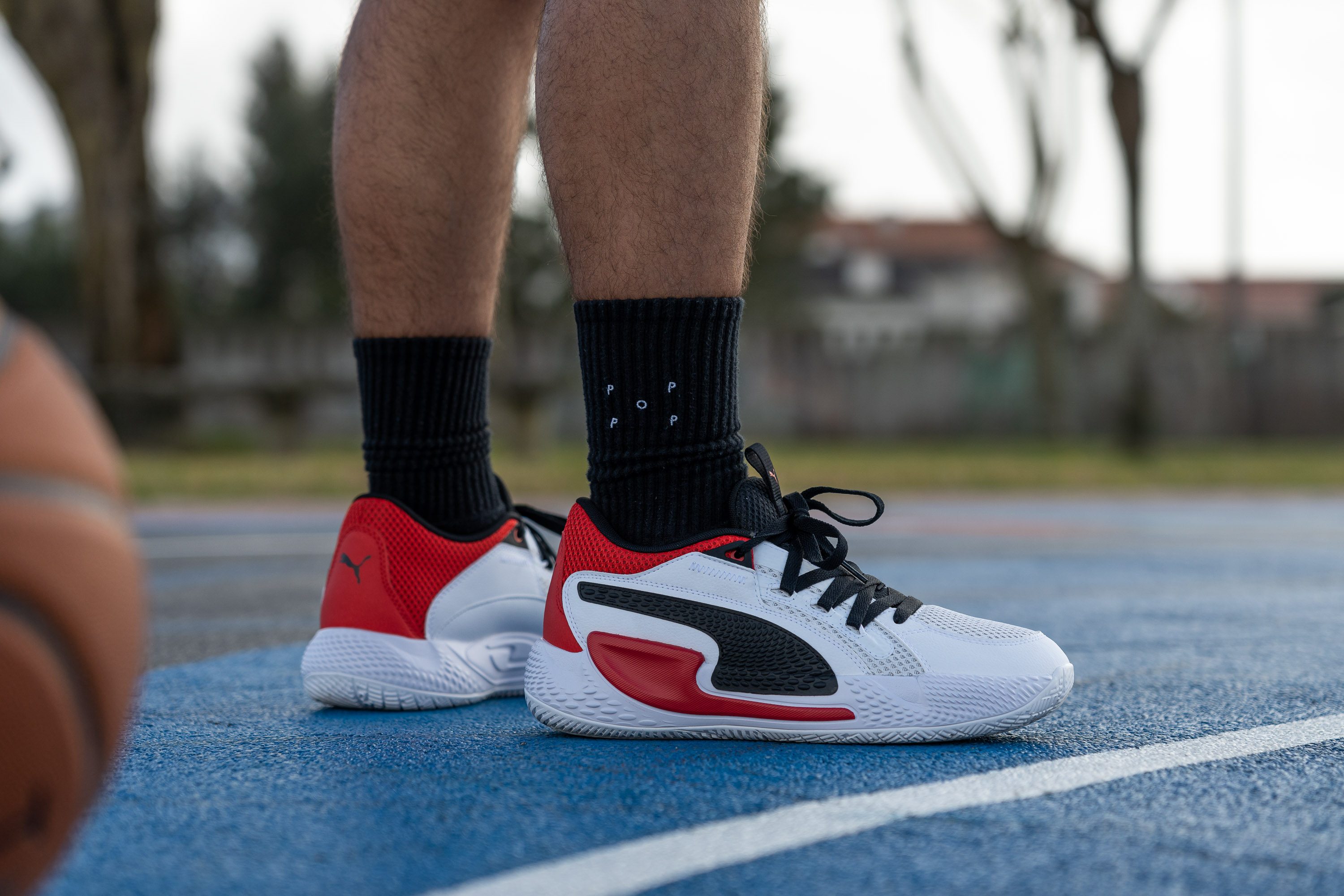
Who should NOT buy
The PUMA Court Rider is made of materials that do their job well; they just do not feel premium. Those who like comfortable fancy stuff are better off with the PUMA RS Dreamer or the Clyde All-Pro. These basketball shoes are signature offers, so we can expect them to be made of materials that not only feel nice but also look so good.
In our opinion, bigger athletes in need of more impact protection are not going to enjoy the PUMA Court Rider. Shoes like the PUMA Rise Nitro and the PUMA MB.02 provide a much more generous helping of cushioning.
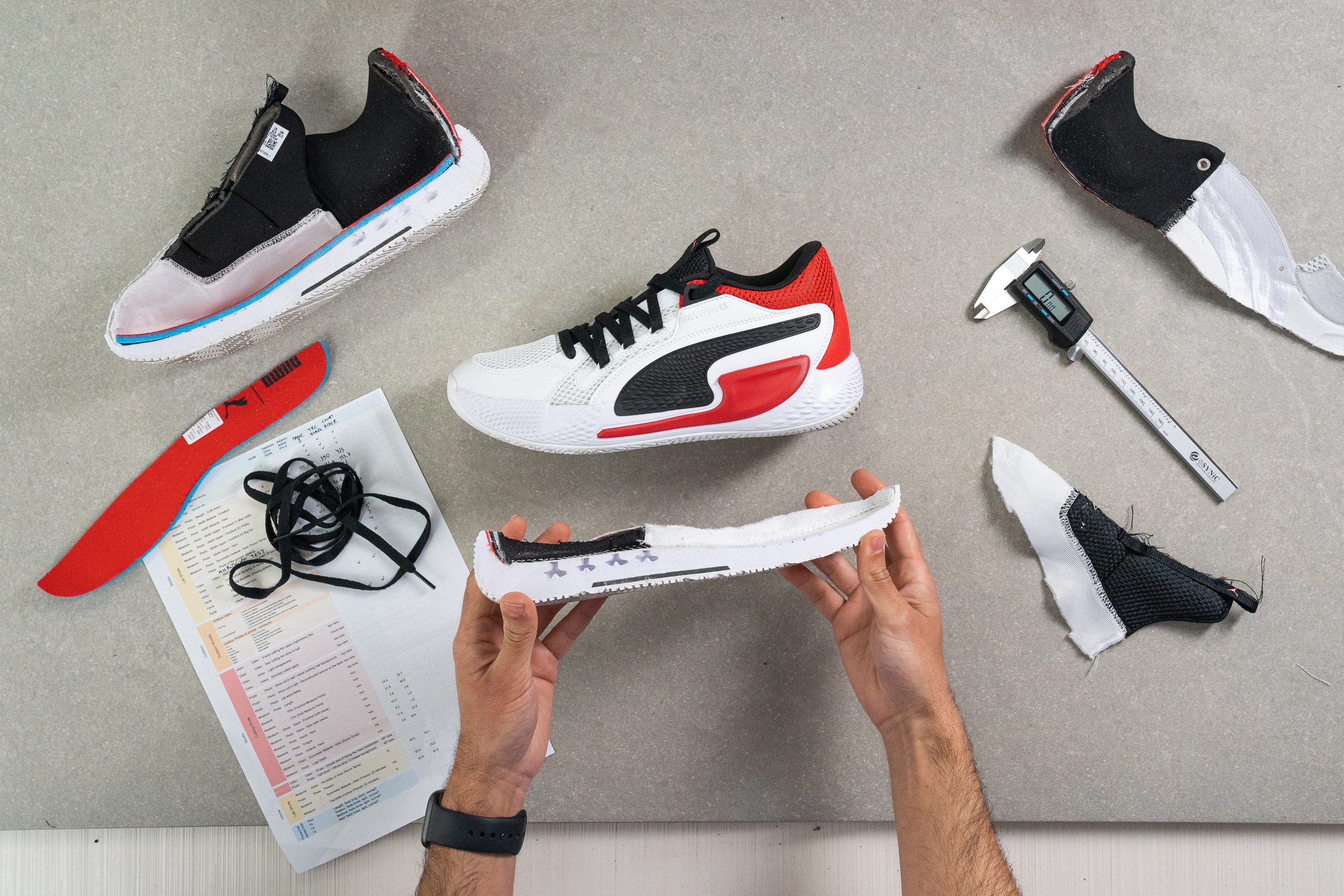
Cushioning
Heel stack
On paper, the heel stack height of the PUMA Court Rider is 30.2 mm, which is the same as most basketball shoes tested in our lab.
However, because of the four hollows embedded under the heel, the shoe feels much more grounded. As the hollows compress, the shoe gets closer to the ground, offering plenty of court feel.
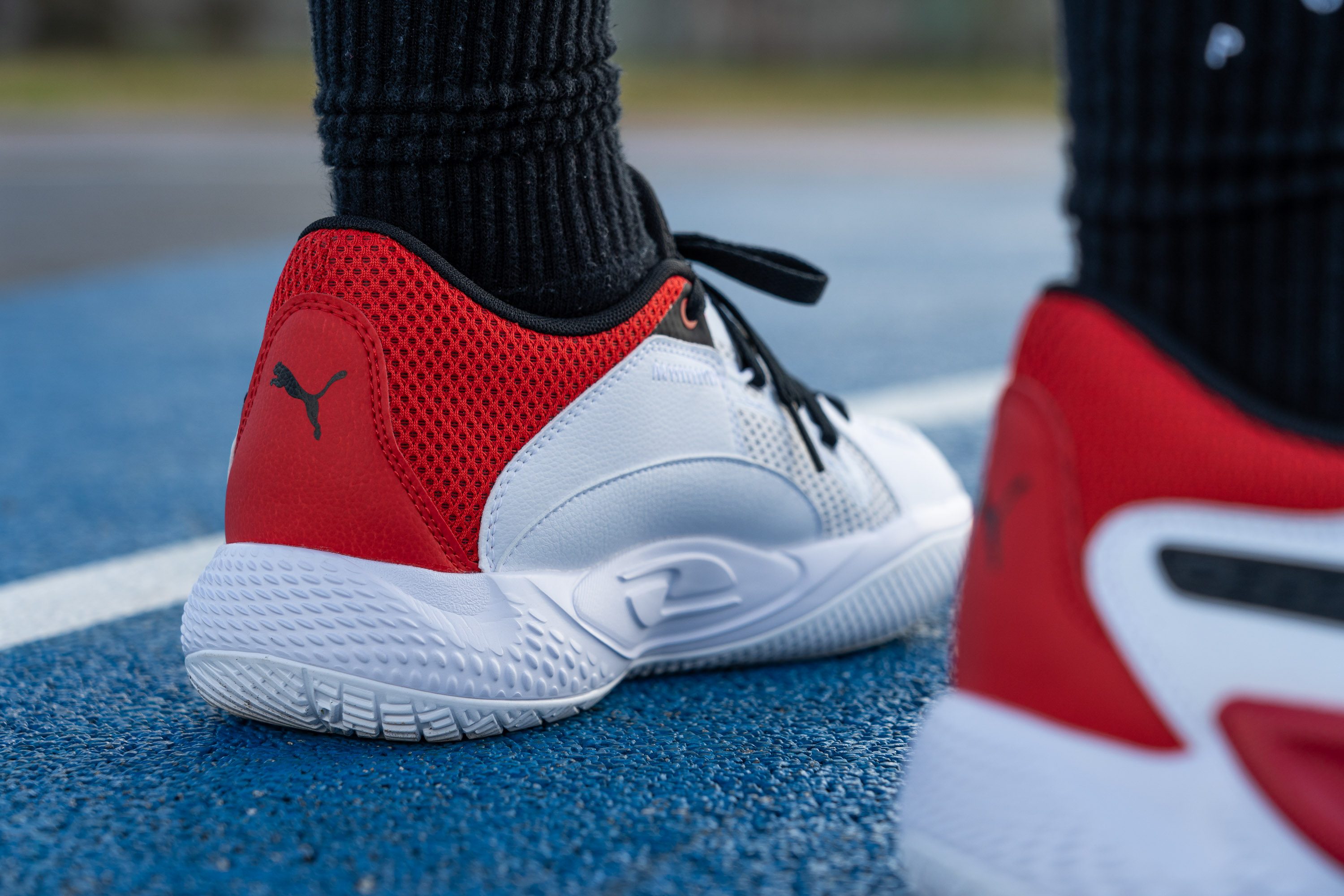
For that reason, we think that this basketball shoe is great for smaller and lighter guards who are often quick on their feet and do a lot of agile footwork.
Impact protection is not this shoe's forte.
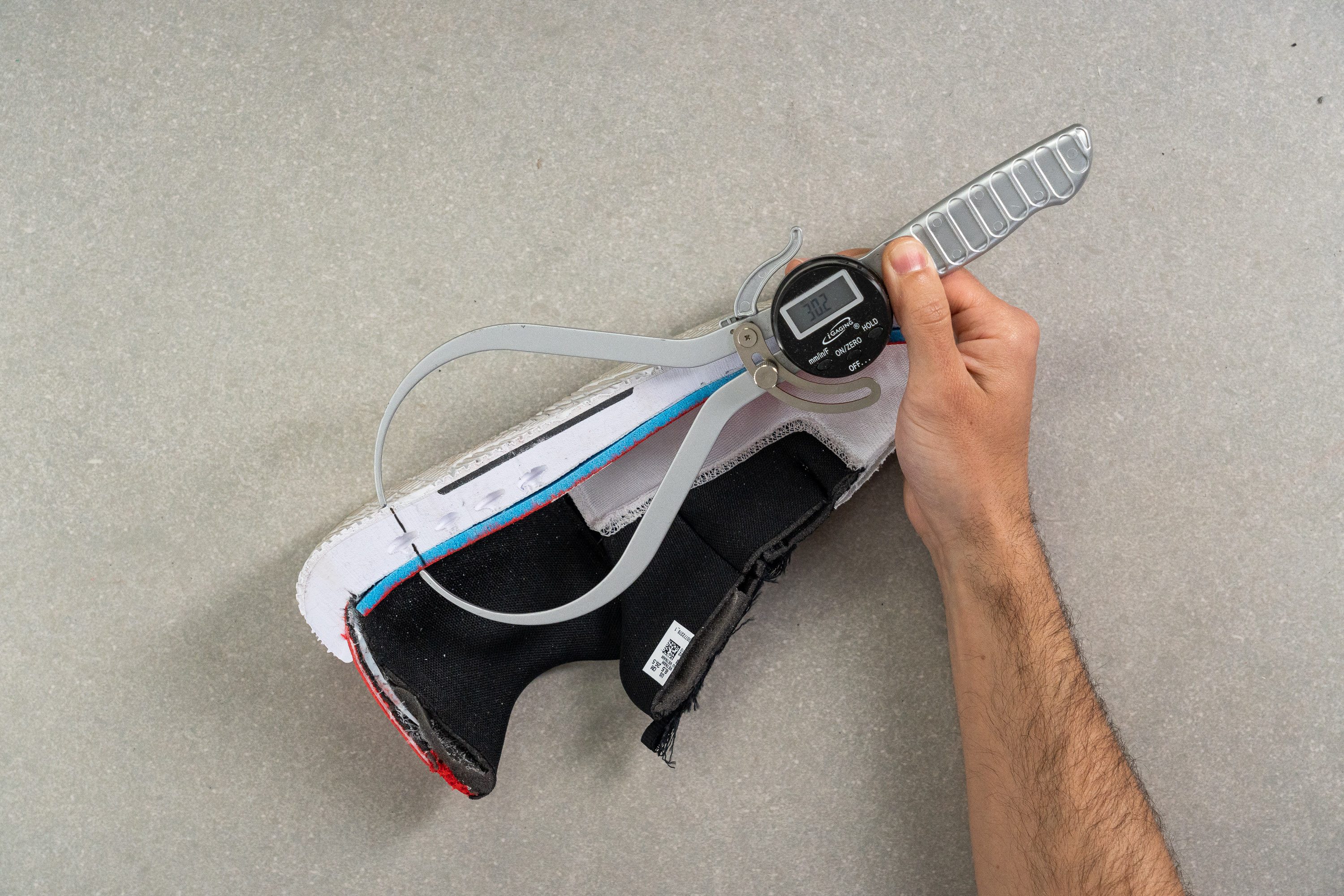
| Court Rider | 30.2 mm |
| Average | 28.8 mm |
Forefoot stack
In the forefoot, we measured the cushioning thickness at 21 mm. It is an average stack height for basketball shoes and doesn't interfere with the shoe's court feel.
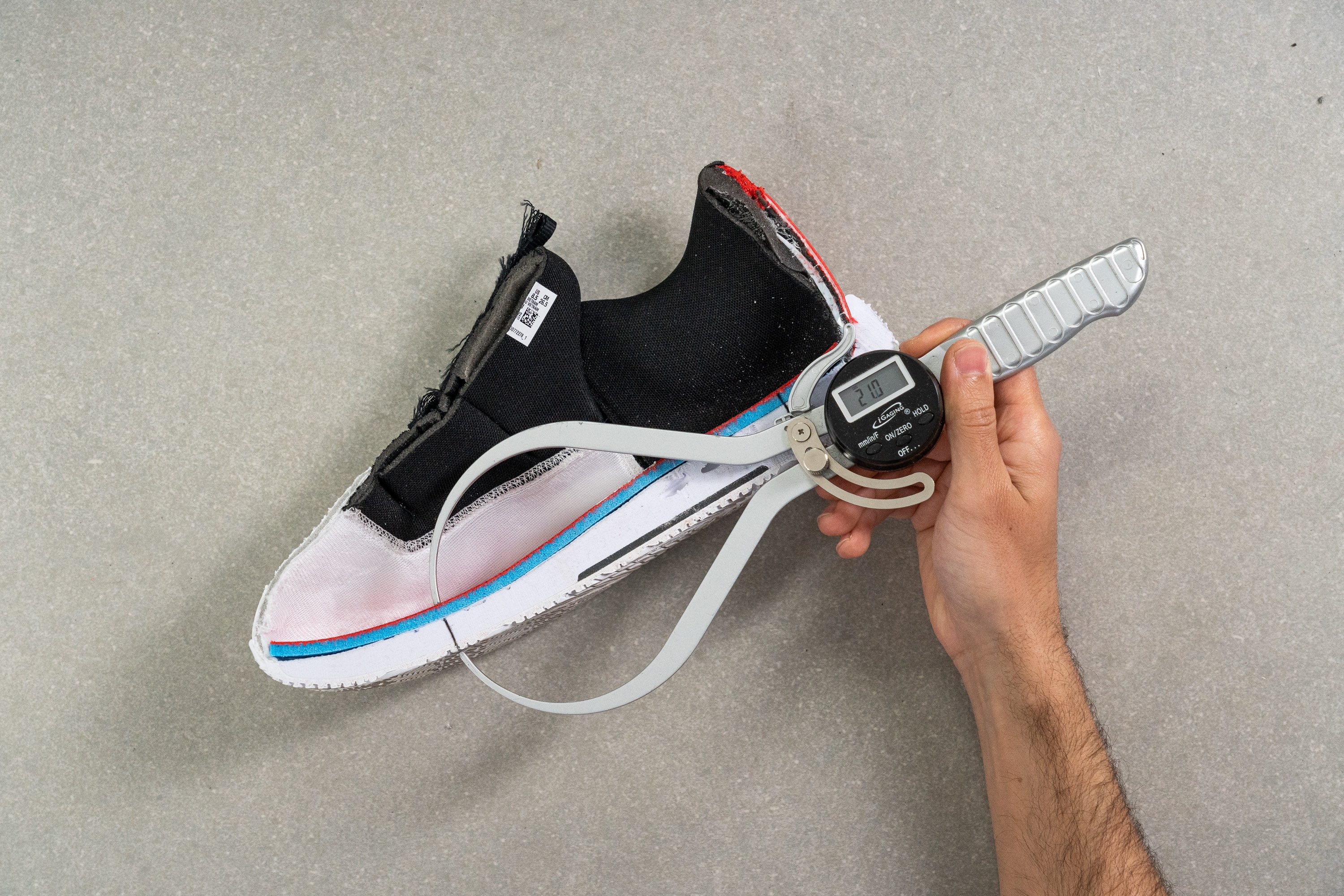
| Court Rider | 21.0 mm |
| Average | 21.4 mm |
Drop
Because of the shoe's dynamic cushioning, its heel-to-toe drop is prone to changing as well.
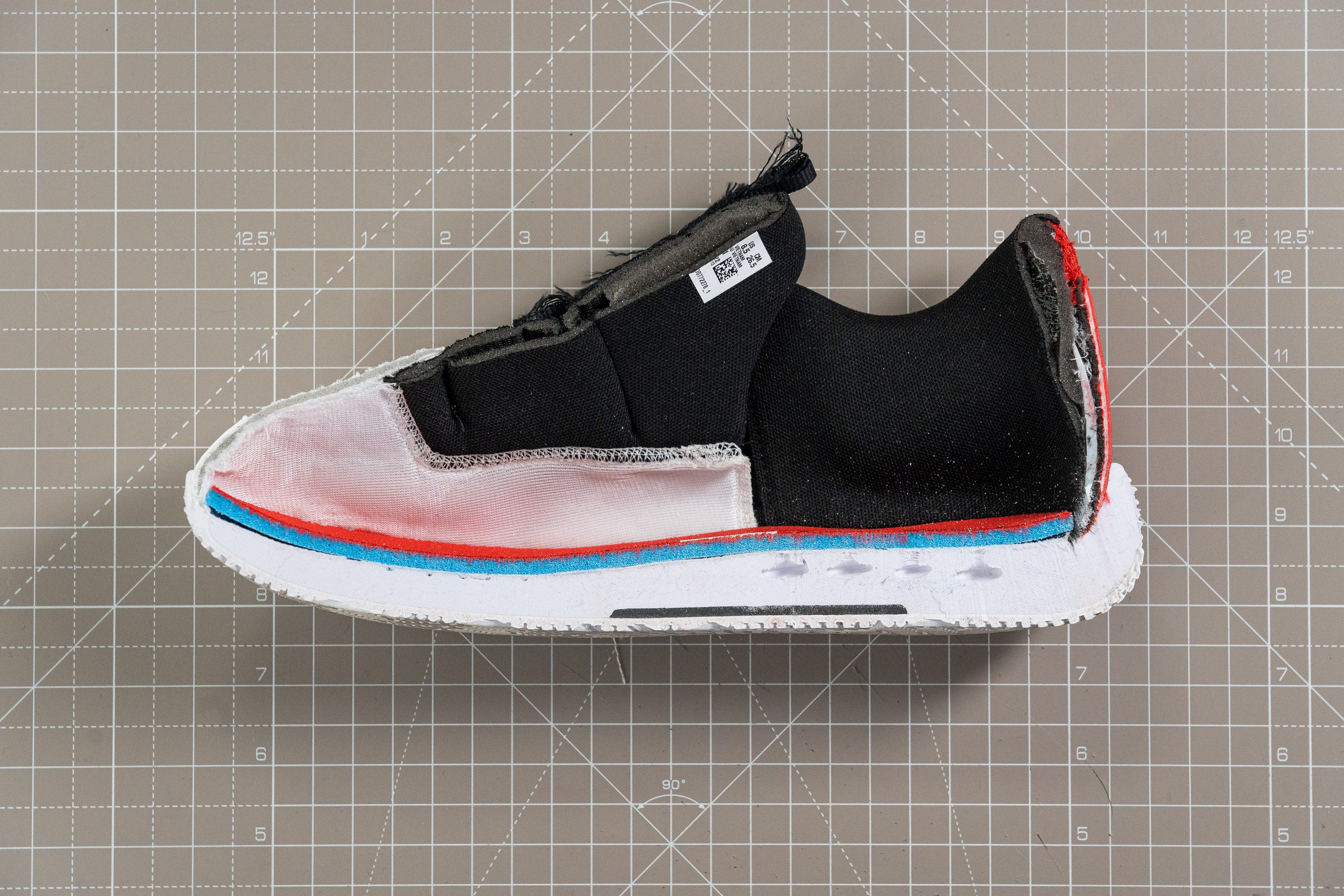
Being 9.2 mm in its "resting state," we assume that it gets a few millimetres smaller under the body weight.
| Court Rider | 9.2 mm |
| Average | 7.4 mm |
Midsole softness
The PUMA Court Rider felt pretty bouncy and responsive throughout our playtest. This is partially due to the firm nature of its foam.
Using a durometer, we measured the foam at 30.4 HA, which is 9% firmer than the average.
This is also a contributing factor to the shoe's excellent ground contact.
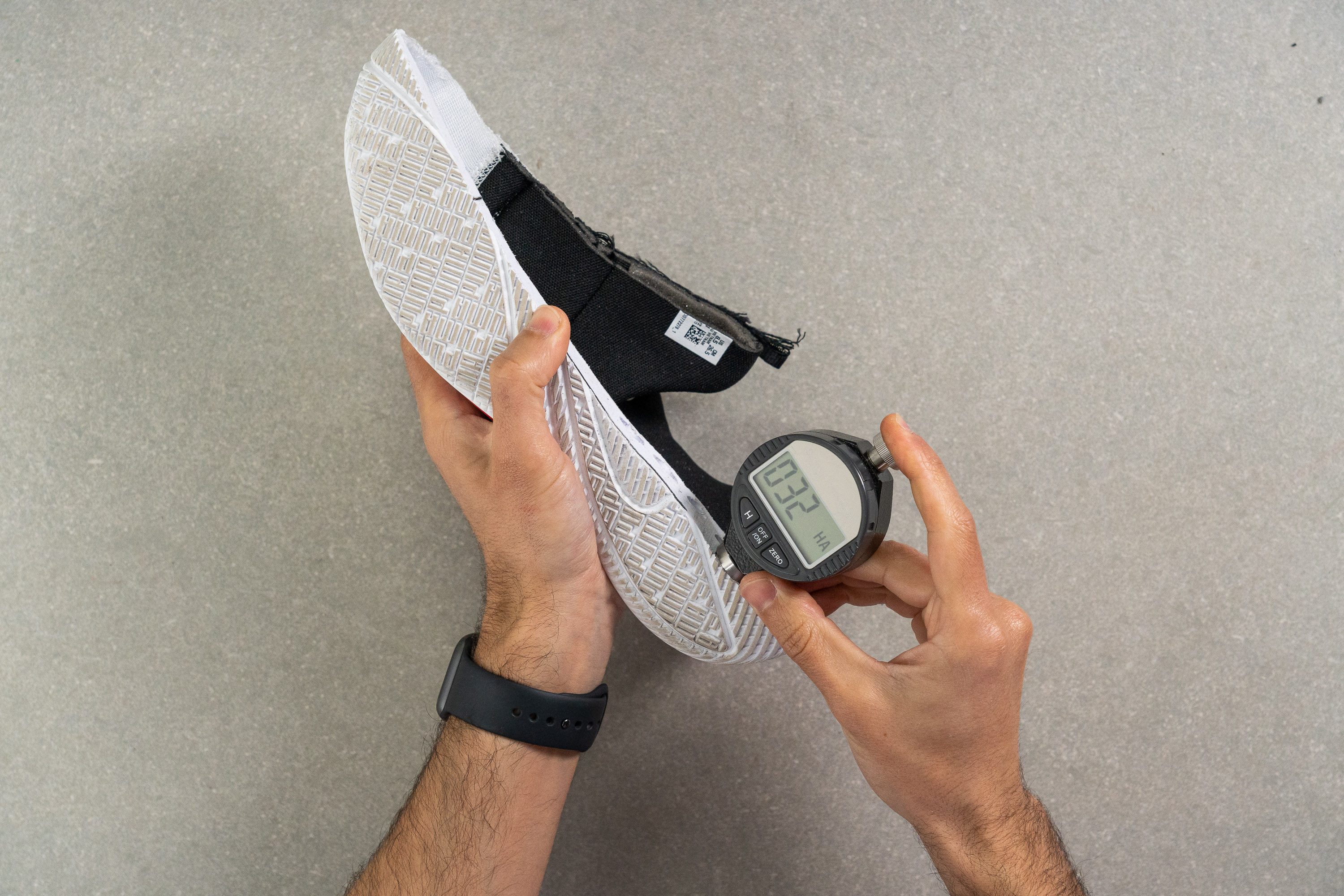
| Court Rider | 30.4 HA |
| Average | 24.3 HA |
Size and fit
Size
PUMA Court Rider fits slightly small (16 votes).
Width / Fit
The PUMA Court Rider runs true to size and fits as expected for our medium-width feet. We don't see any need for size adjustment.
In the widest part of the forefoot, we measured the shoe at 100 mm - a very much average width.
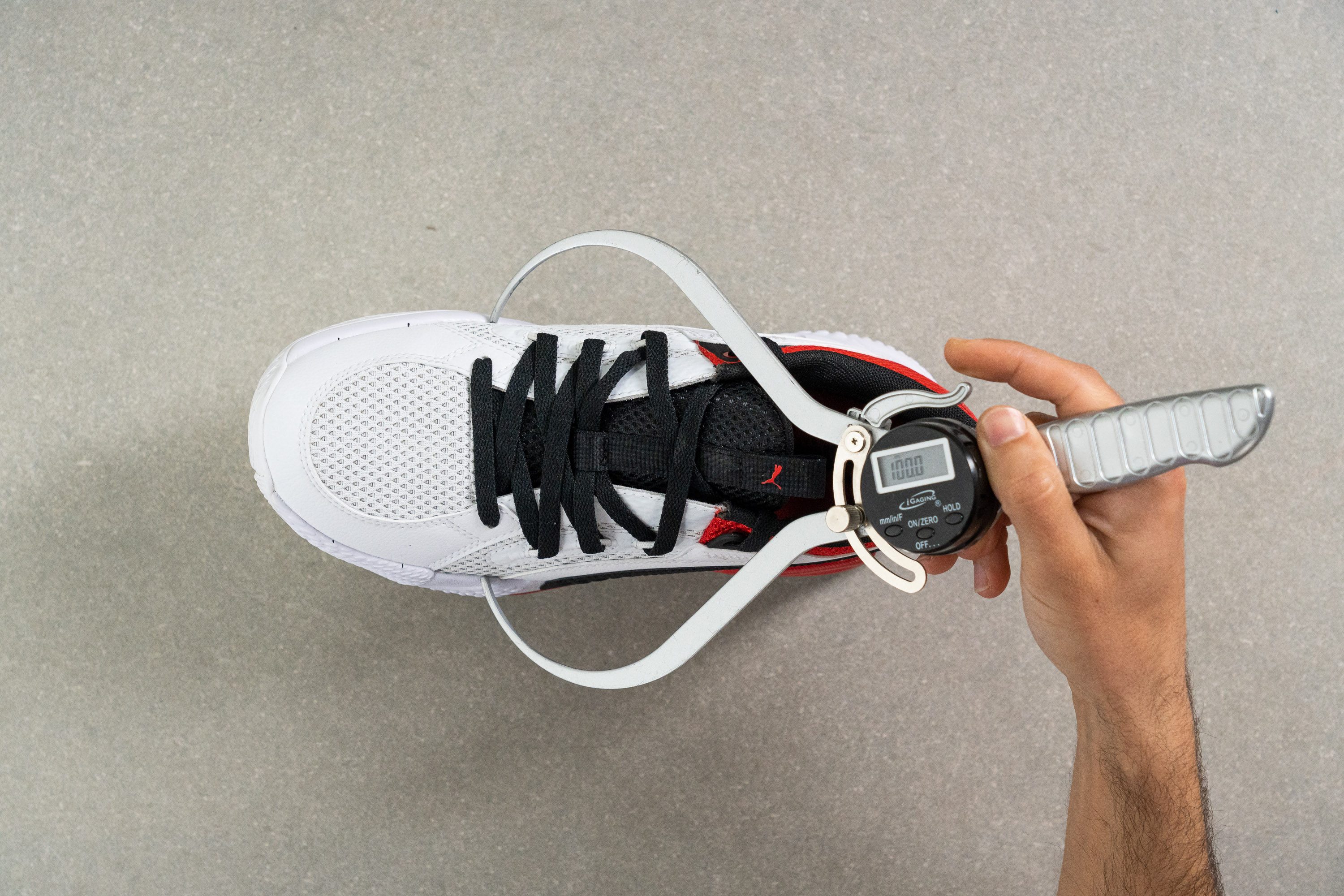
This test follows an older methodology, which is why you don't see recently tested shoes in the chart. Results from different methodologies can not be compared.
| Court Rider | 100.0 mm |
| Average | 101.6 mm |
Toebox width
The same goes for the tip of the toebox. The shoe doesn't get narrower than most basketball shoes we've tested.
Our calliper shows 77.4 mm of width around the big toe.
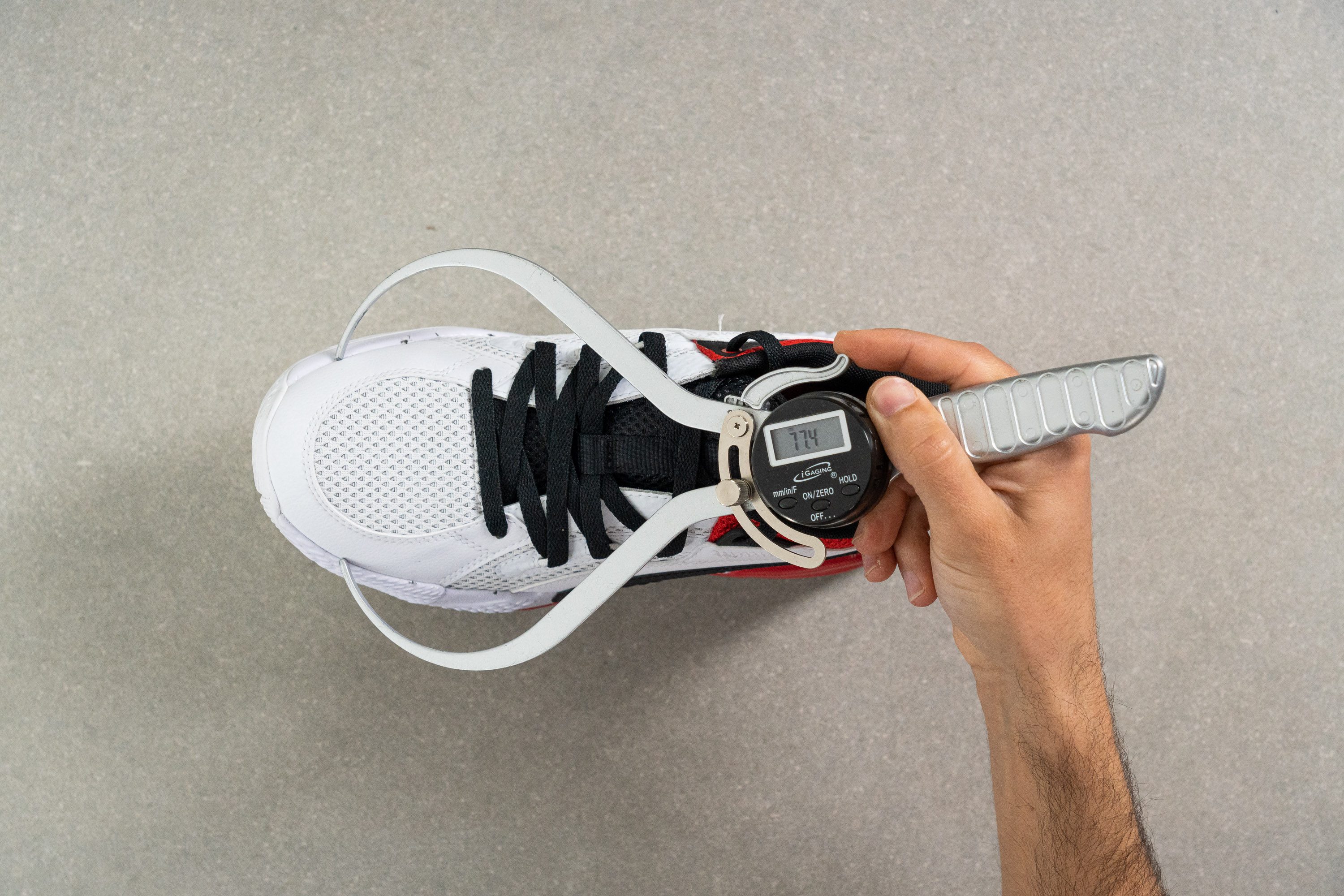
This test follows an older methodology, which is why you don't see recently tested shoes in the chart. Results from different methodologies can not be compared.
| Court Rider | 77.4 mm |
| Average | 76.9 mm |
Flexibility / Stiffness
Despite its overall stiff construction, the PUMA Court Rider finds some room for flexibility.
Based on our force gauge measurement, it takes 34.9N to bend the shoe to a 90-degree angle. That is 68% less than it takes on average!
It definitely helps the shoe stay more manoeuvrable on the court.
This test follows an older methodology, which is why you don't see recently tested shoes in the chart. Results from different methodologies can not be compared.
| Court Rider | 34.9N |
| Average | 38.8N |
Weight
At first, we thought that our scales were broken...but no, they weren't. That's how heavy the PUMA Court Rider really is!
At 15.8 oz (449g), it is a whole 2 ounces heavier than average! We really don't get how this PUMA shoe managed to outweigh even the Nike LeBrons.
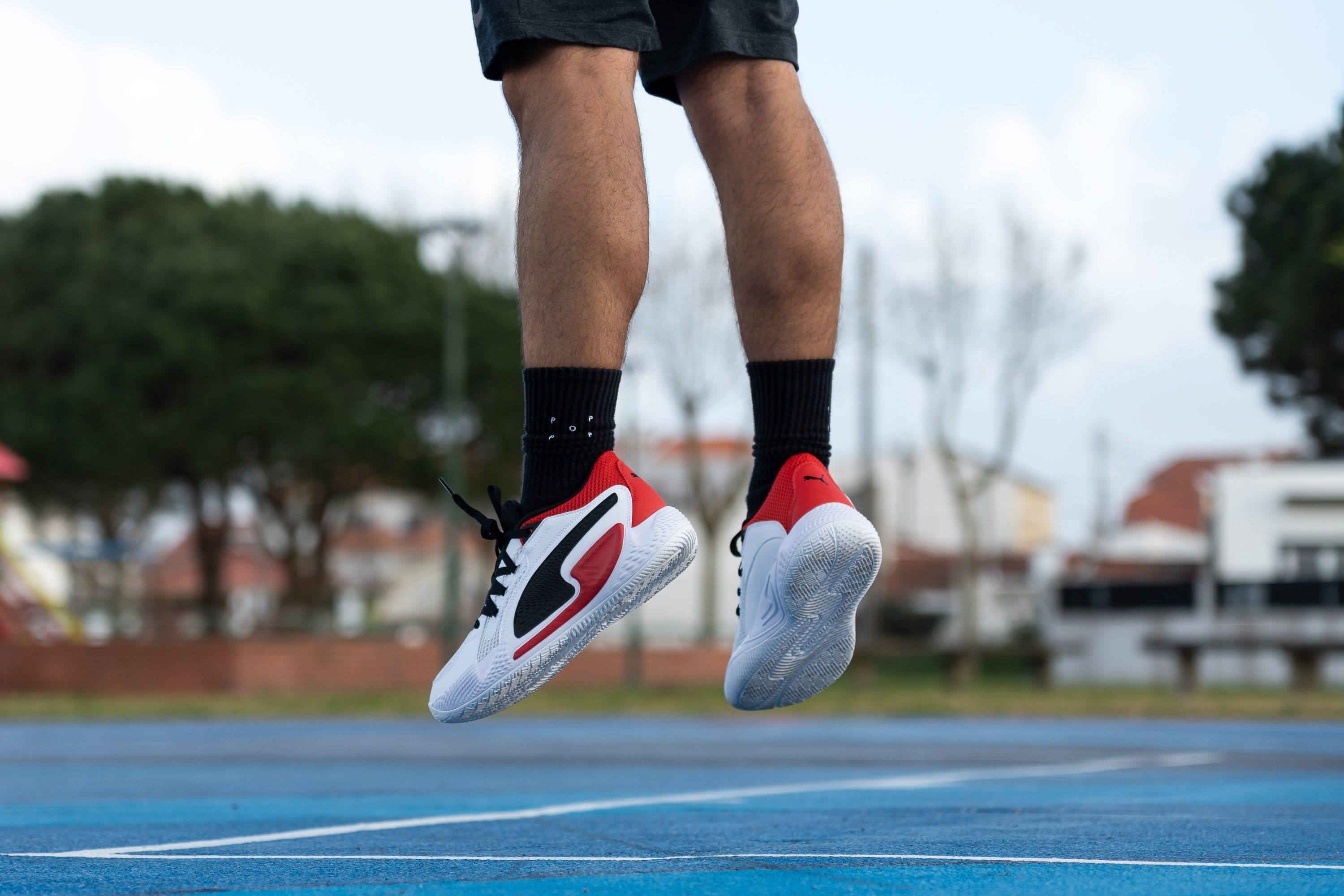
We can't really blame it on the price of the shoe either. There are a lot of budget-friendly options out there that weigh much less. Take the Jordan Luka 1 (12.8 oz) or the Nike Precision 6 (12.0 oz), for example.
| Court Rider | 15.8 oz (449g) |
| Average | 13.8 oz (391g) |
Breathability
What may seem like breathable mesh, turns out to be misleading. We found the PUMA Court Rider to be a toasty shoe, both on the court and in our lab tests.
Pumping smoke through the shoe's upper, it barely came out on the other side. The only streak of vapour appeared around the tongue. For that reason, we rated the shoe's breathability as only 2 out of 5.
In the transparency test below, we put the shoe's upper against a bright light to show you that there are no ventilation pores in the fabric.
We also turned to our microscope to take a closer look at the mesh.
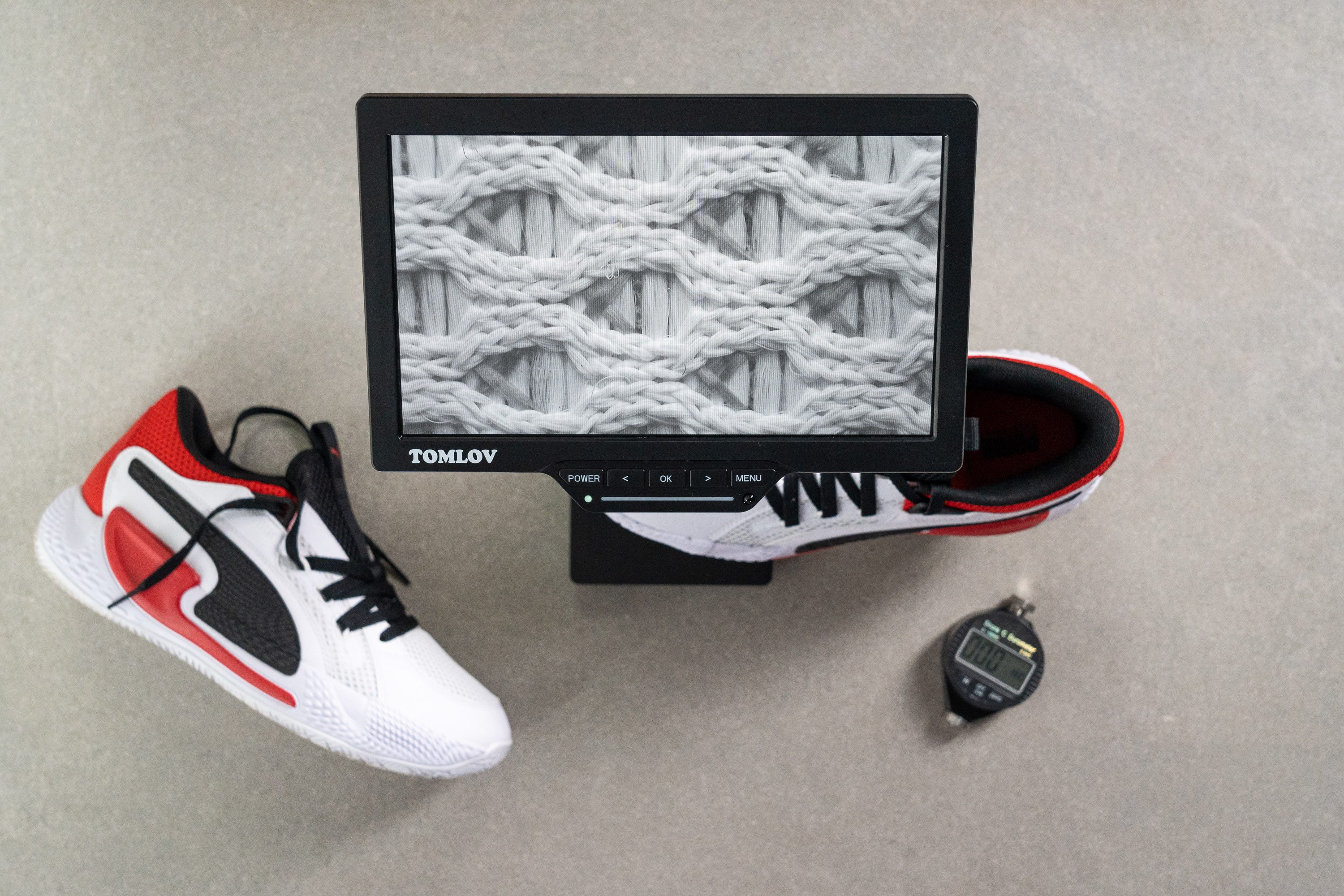
The fabric is made of multiple layers which, when combined, form a pretty tightly woven material.
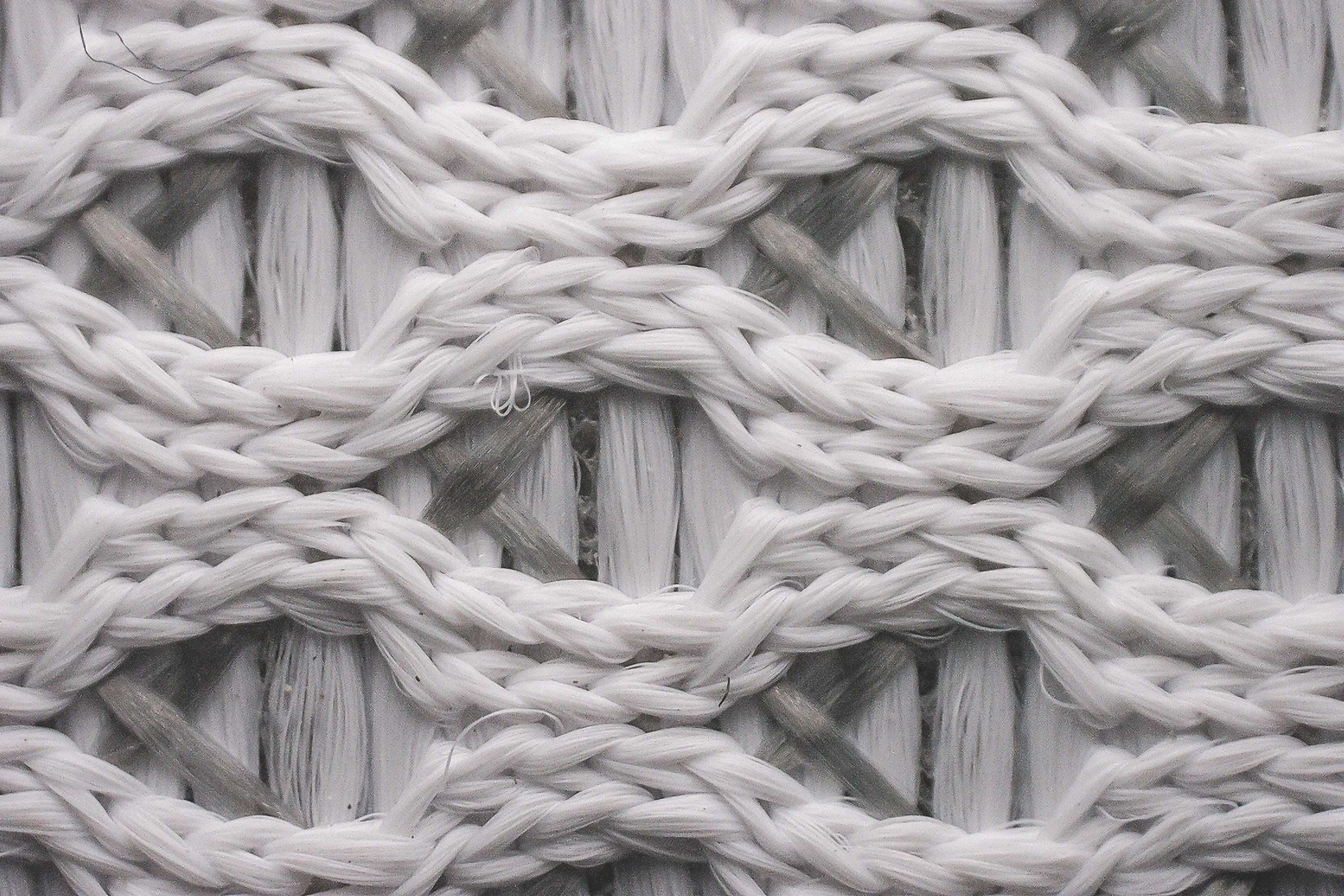
| Court Rider | 2 |
| Average | 2.5 |
Stability
Lateral stability test
We were amazed at how stable and supportive the PUMA Court Rider feels. Those extra layers of material paired with a stiff heel counter and a firm base worked wonders for lateral movements.
Pretty cool that the PUMA logo works as a supportive overlay.
Our feet remained locked in place and we experienced no risks of ankle rolling either.
Torsional rigidity
The Court Rider has a very solid build which doesn't let the shoe twist. As a result, this PUMA shoe feels like one with the foot during intensive footwork.
In our manual test of torsional rigidity, we rated the shoe as 4 out of 5. This is almost as stiff as it can get in basketball shoes.
| Court Rider | 4 |
| Average | 4.5 |
Heel counter stiffness
The shoe's heel counter also scores high on the stiffness test. Actually, it earned the highest score of 5/5!
Rigid but well-padded, it is the perfect formula for keeping the heel securely in place.
| Court Rider | 5 |
| Average | 3.8 |
Midsole width - forefoot
The ensemble wouldn't be complete without a nice and wide base. We measured the widest part of the forefoot at 113.7 mm, which is about the same as the average.
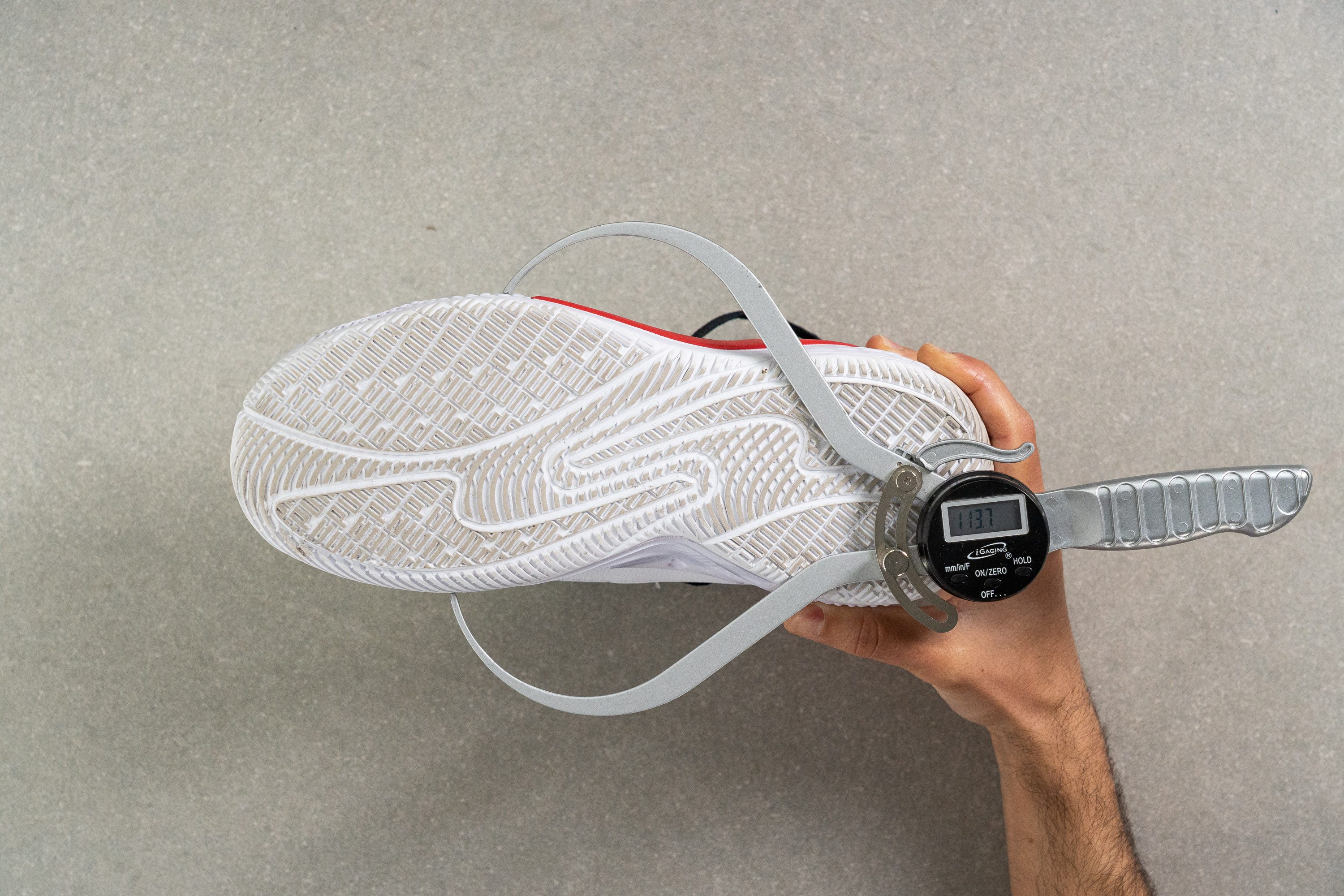
| Court Rider | 113.7 mm |
| Average | 114.8 mm |
Midsole width - heel
The heel, on the other hand, is insanely wide!
Our calliper shows a reading of 98 mm in the widest part of the heel. This is almost a whole centimetre wider than average! This is among the widest landing areas we've seen in our lab so far.
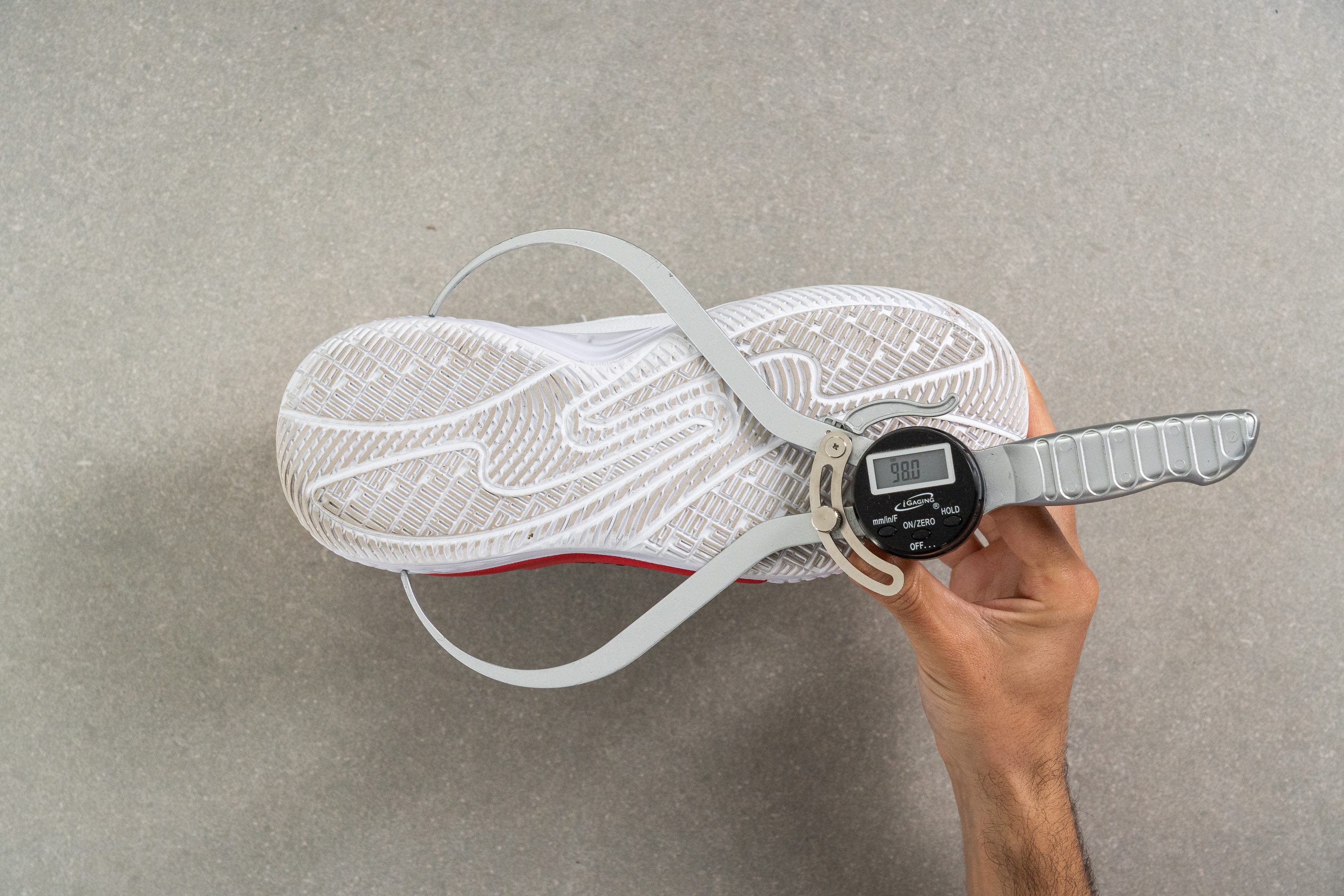
| Court Rider | 98.0 mm |
| Average | 89.7 mm |
Durability
Outsole hardness
For some reason, PUMA tends to choose soft rubber for its more affordable basketball shoes.
Pressing our durometer against the outsole, we found that the rubber is only 72 HC (12% softer than average). For that reason, we do not recommend exposing the shoe to outdoor courts too often. Soft rubbers tend to wear out much faster.
There are budget-friendly shoes at the same price point that have harder rubbers. Take the Nike LeBron Witness 7 for example.
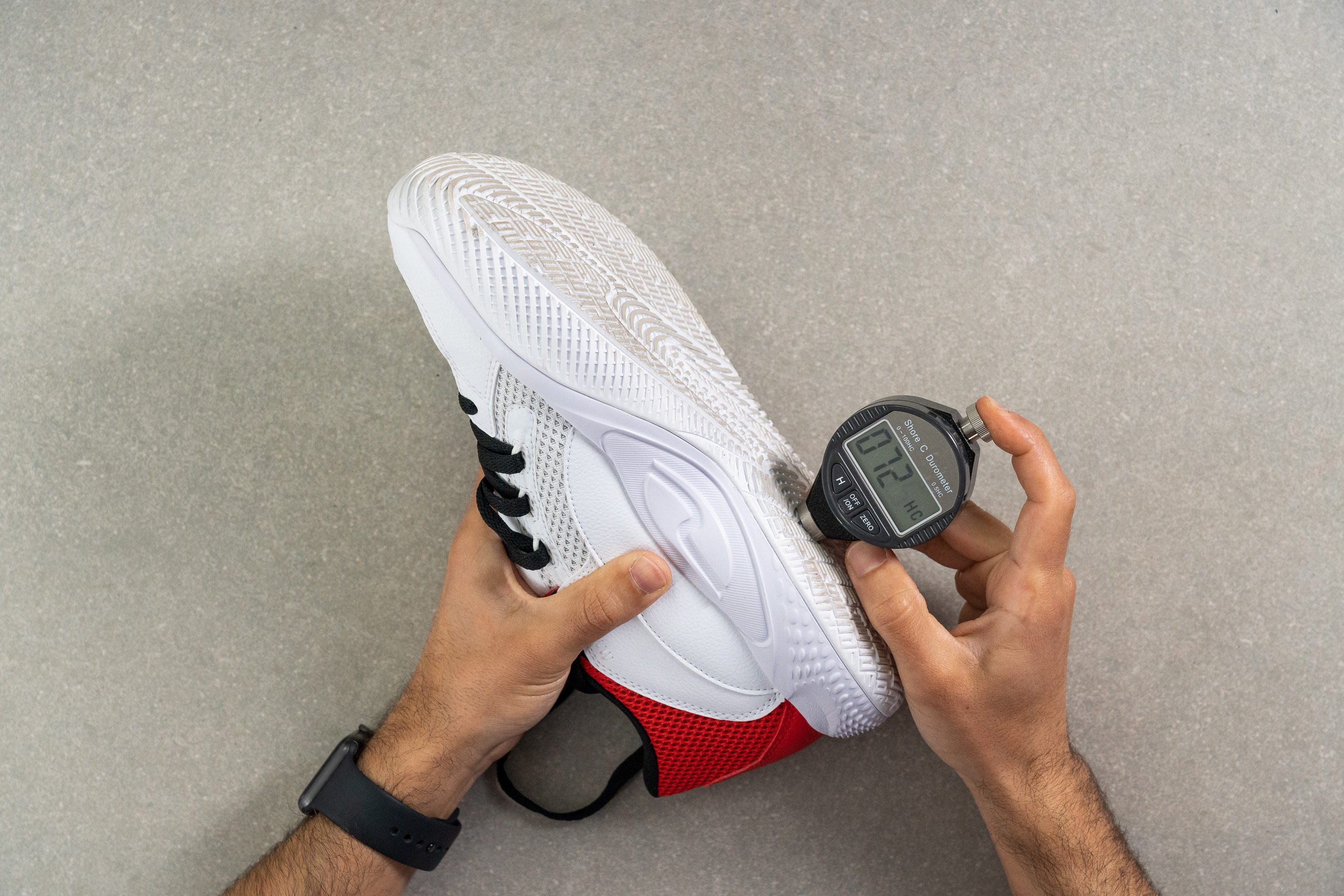
| Court Rider | 72.0 HC |
| Average | 81.5 HC |
Outsole thickness
The amount of rubber used in the Court Rider's outsole is quite average. Our calliper shows 4.1 mm of thickness.
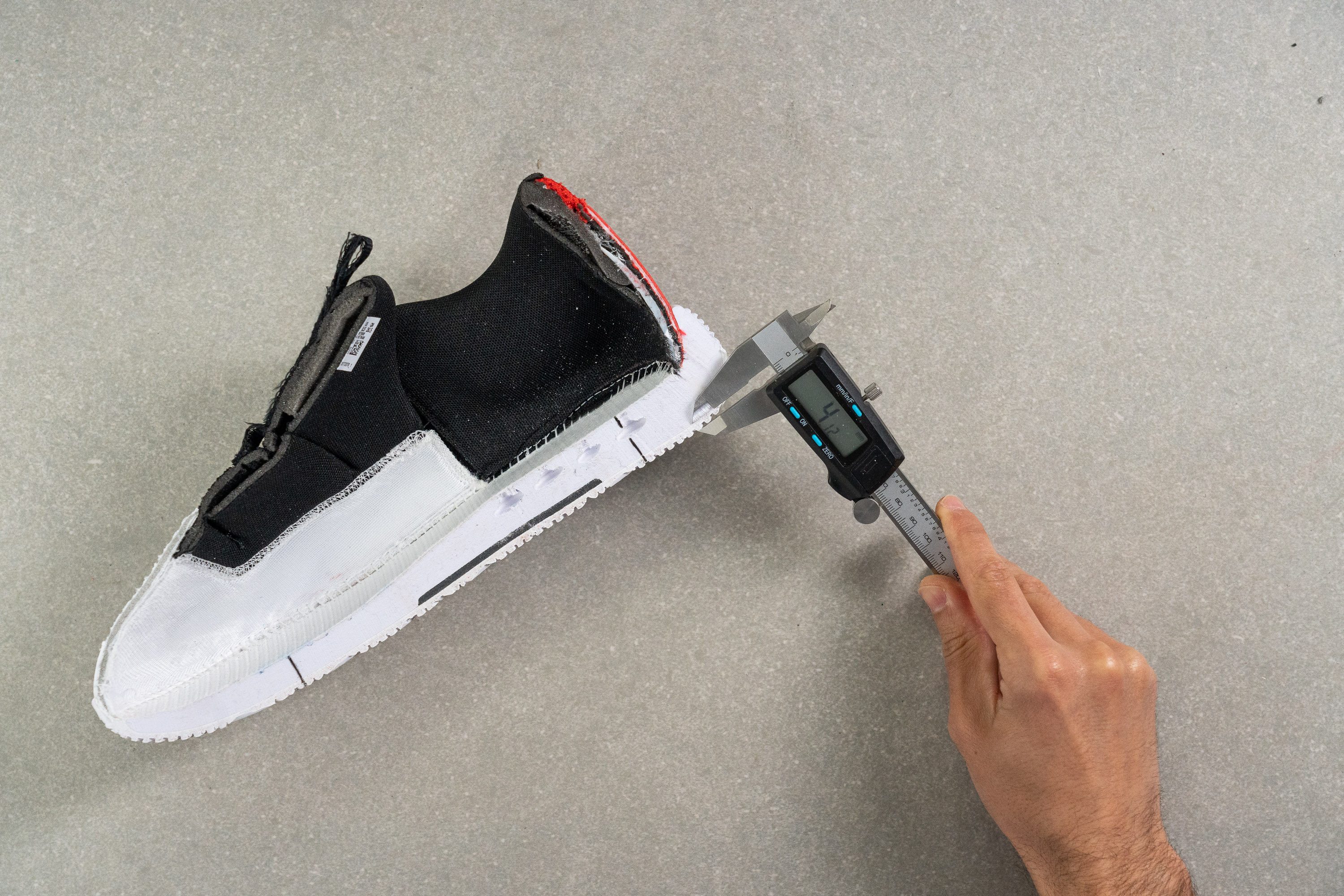
| Court Rider | 4.1 mm |
| Average | 4.0 mm |
Misc
Insole thickness
A thick insole is added to buffer the foot from the firmness of the sole. At 5 mm, it is a little thicker than average.
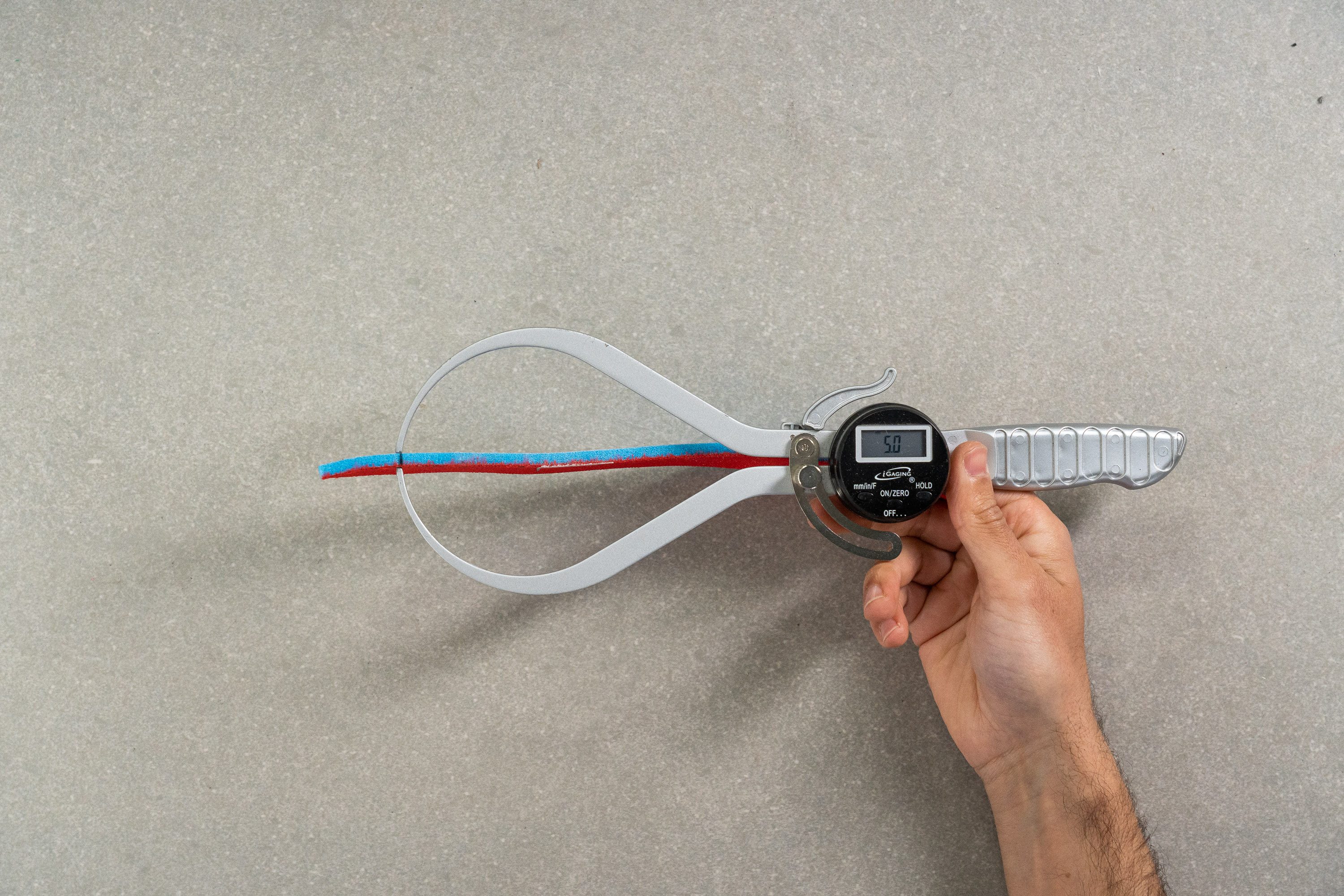
| Court Rider | 5.0 mm |
| Average | 4.9 mm |
Removable insole
For those who rely on custom orthotics, the shoe's insole is easily removable.
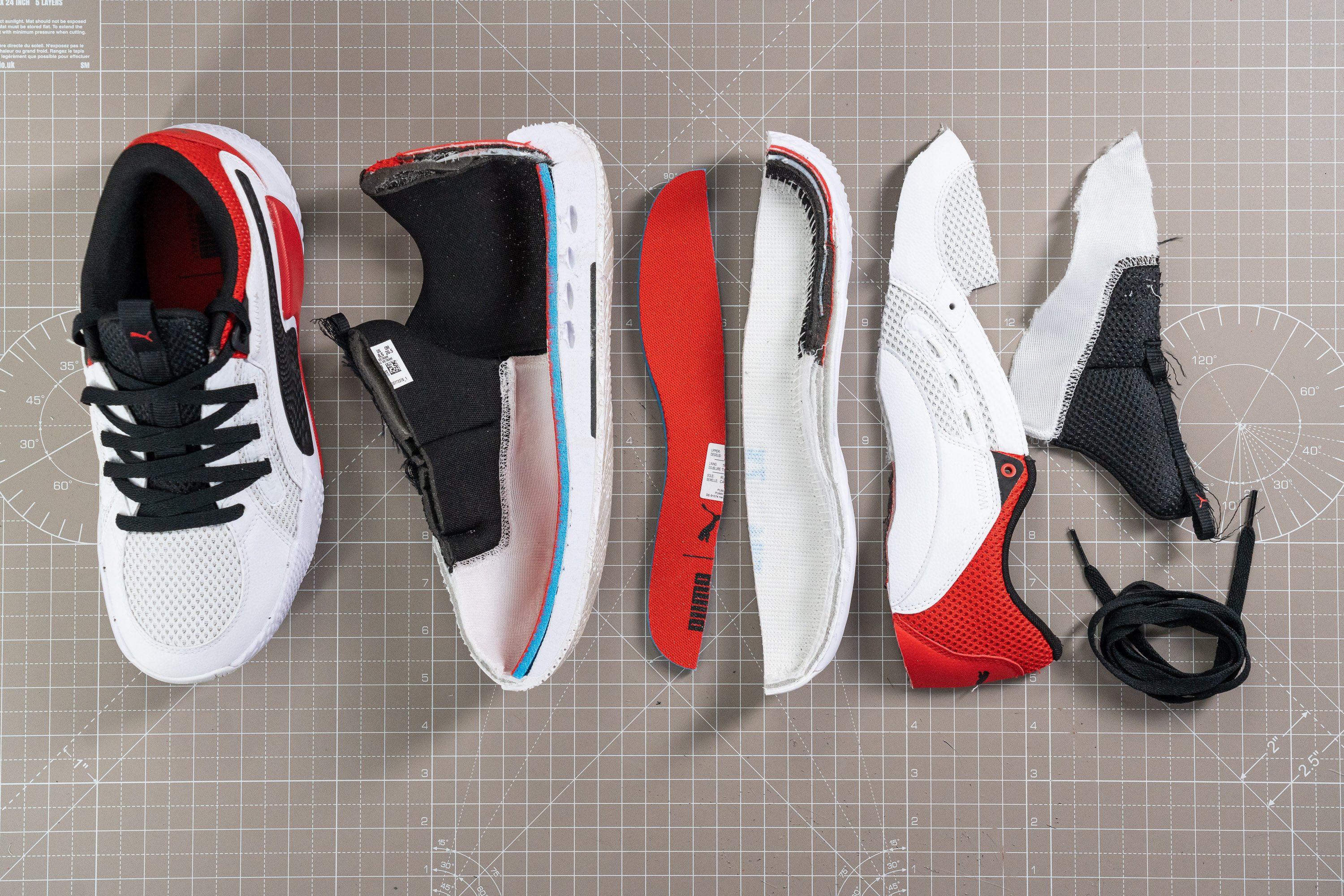
| Court Rider | Yes |
Tongue padding
The tongue padding is super generous in the Court Rider. Measuring it with a calliper returned a whopping 12.9 mm! That's 3.5 mm thicker than average. No wonder the shoe feels so cosy against the instep.
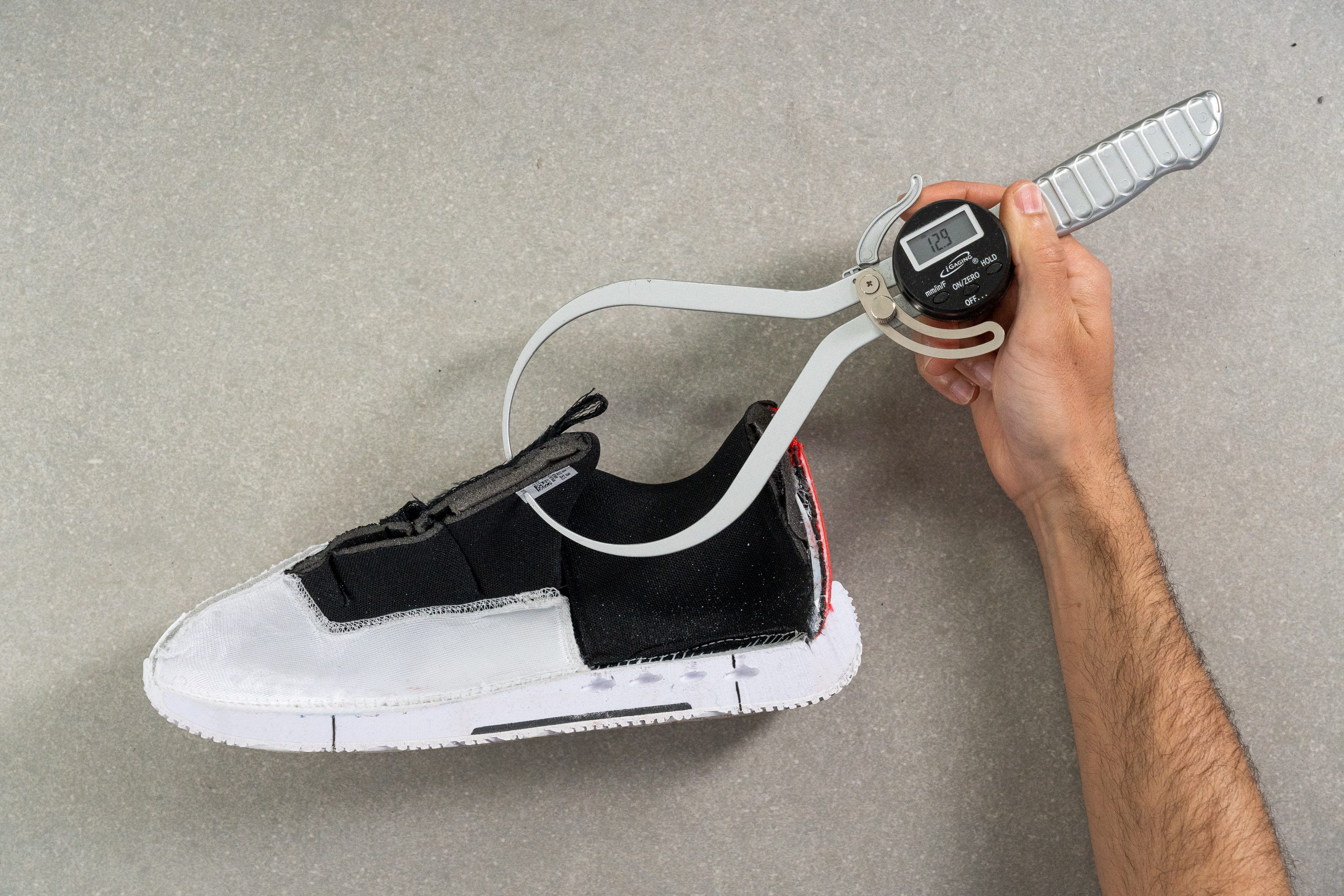
| Court Rider | 12.9 mm |
| Average | 9.3 mm |
Tongue: gusset type
The tongue is fully gusseted in the Court Rider. It helps to keep the foot in place for intense side-to-side movements big time!
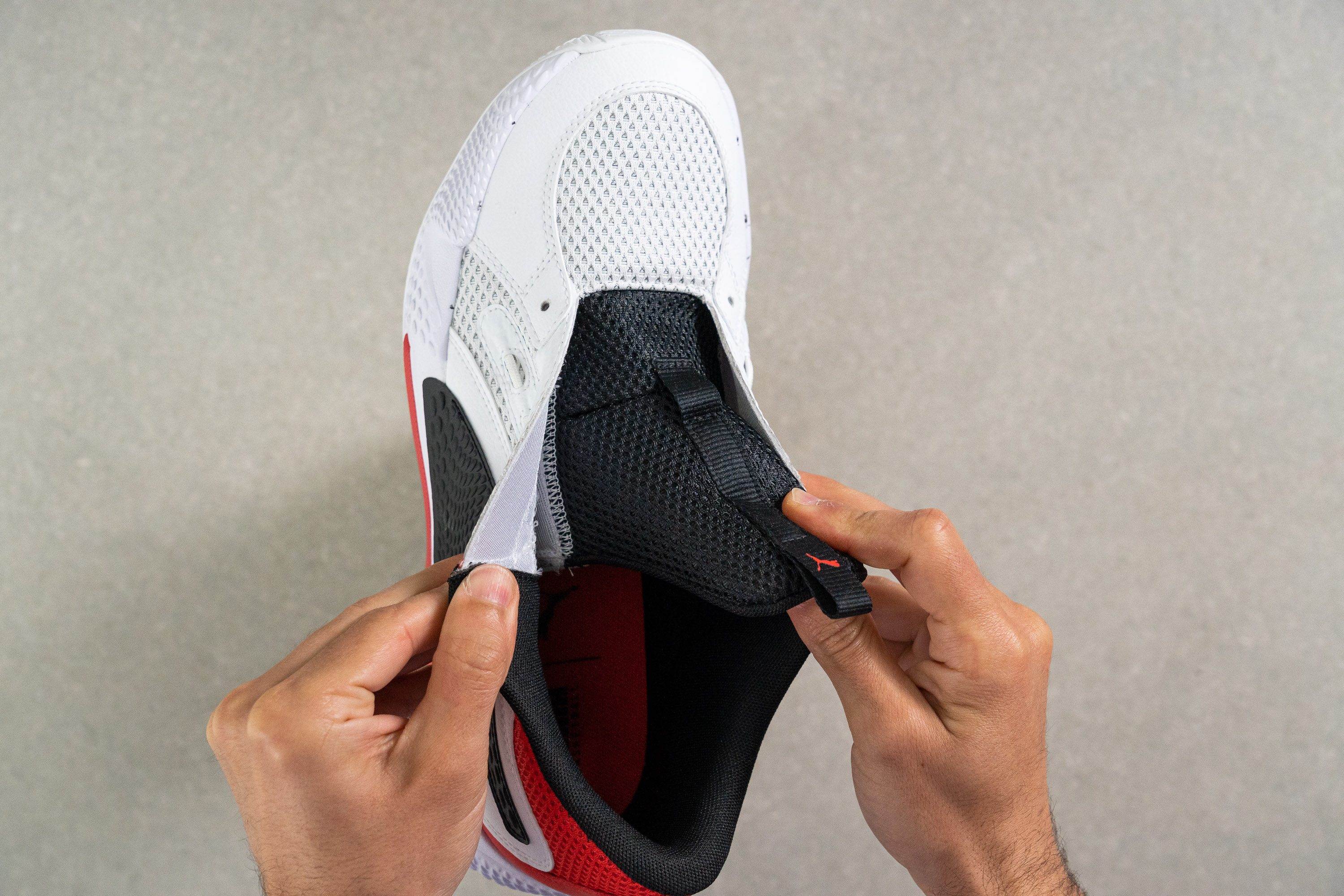
| Court Rider | Both sides (full) |
Heel tab
The shoe doesn't make use of any pull tabs or finger loops. That's unfortunate because the gusseted tongue makes the shoe opening smaller which also makes it trickier to put the shoe on.
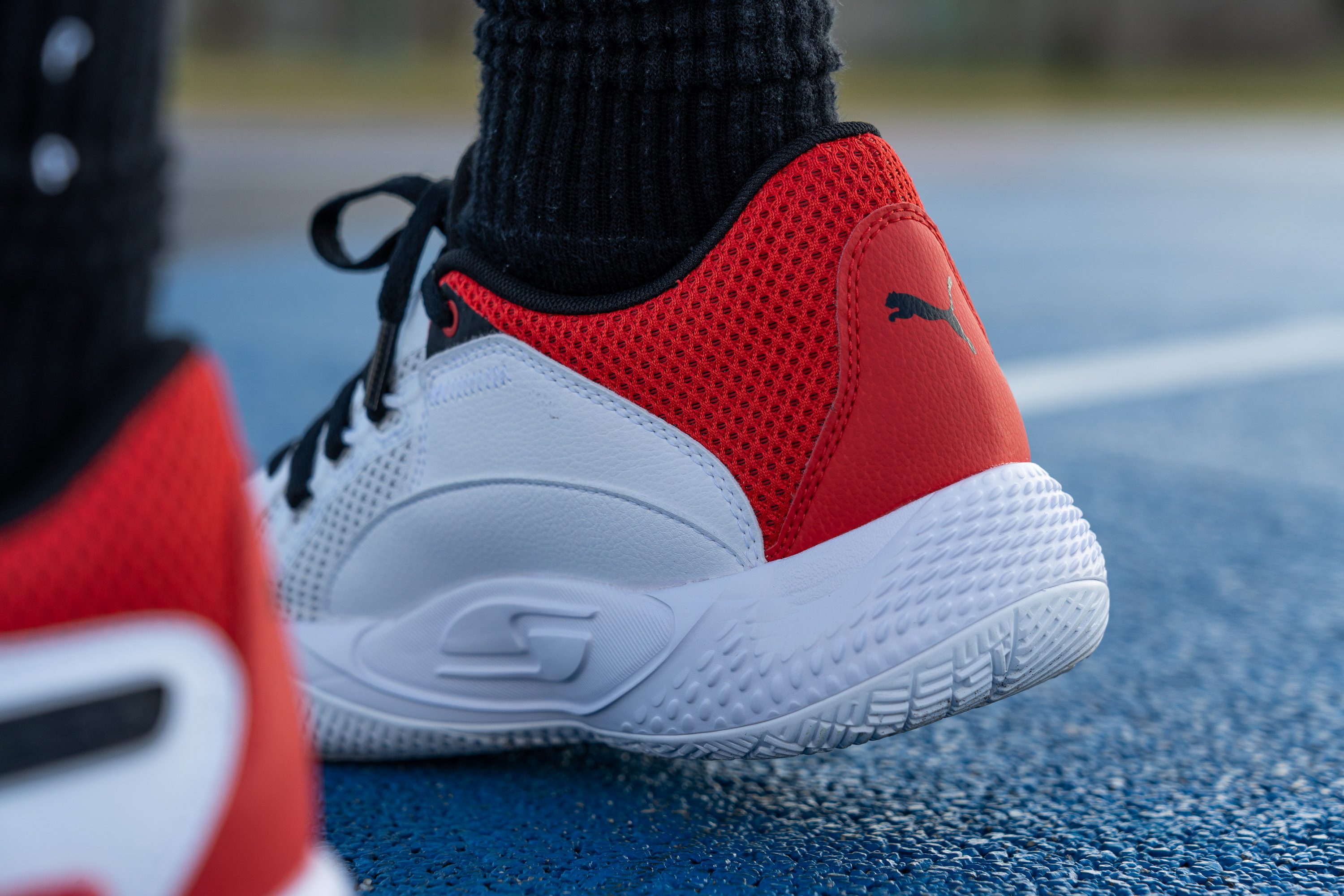
| Court Rider | None |

